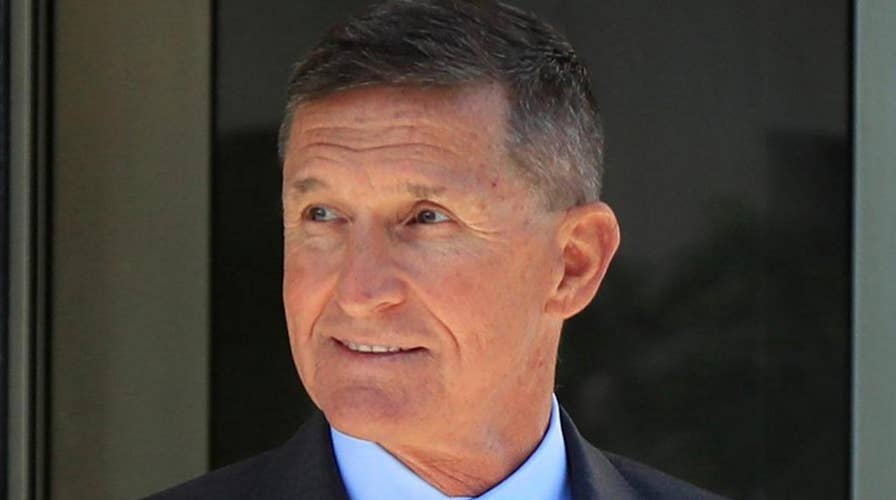FBI accused of manipulating Flynn records from 2017 interview
Former National Security Adviser Michael Flynn's legal team accuses the FBI of misconduct. Author of 'The Plot Against the President' Lee Smith reacts.
A federal judge on Monday rejected Michael Flynn's comprehensive requests for exculpatory information that may have been withheld by the FBI, saying that the former national security adviser had waived his fundamental constitutional rights by pleading guilty to making false statements.
The order from U.S. District Judge Emmet Sullivan in Washington also set a Jan. 28 sentencing date in the case, and essentially crushed any remaining hopes that Flynn might see his guilty plea tossed. The ruling came just days after Justice Department Inspector General Michael E. Horowitz identified a slew of misconduct by FBI agents investigating former Trump aide Carter Page -- including by a little-known agent who interviewed Flynn at the White House in January 2017.
In his order, Flynn cited prosecutor Brandon Van Grack, formerly a member of Special Counsel Robert Mueller's team, as saying, "[B]y pleading guilty in this case [Mr. Flynn] agrees to waive certain rights afforded by the Constitution of the United States," including the right "to challenge the admissibility of evidence offered against [him.]"
Flynn's guilty pleas, Sullivan wrote, "effectively bar him from raising claims based on any evidence obtained in violation of the Fourth Amendment." Even if Flynn had not waived his Fourth Amendment rights, Sullivan argued that Flynn still needed to "establish that the requested information is favorable" to his defense in order to obtain it -- something he has "failed" to do, the judge said.
The order pushed the case closer to a resolution following months of challenges and arguments from Flynn's attorneys, who had leveled a series of accusations against the FBI and the Justice Department. Although the government has previously sought only probation for Flynn, that could change.
Sullivan, who received appointments from Presidents Bill Clinton, Ronald Reagan and George H.W. Bush, asserted in his 92-page opinion that Flynn's defense had neglected "to explain how most of the requested information that the government has not already provided to him is relevant and material to his underlying offense."
"Mr. Flynn cites no controlling precedent holding that an uncharged individual is entitled to Brady evidence during an ongoing criminal investigation," Sullivan wrote, referring to exculpatory information possessed by the government. Sullivan added: "Under Brady ... 'the Government has no duty to disclose evidence that is neutral, speculative, or inculpatory, or evidence that is available to the defense from other sources.'"
Flynn had argued that FBI agents manipulated official records of his White House interview. His attorney also referenced a purported conversation between former Director of National Intelligence James Clapper and Washington Post reporter David Ignatius, claiming Clapper told the reporter "words to the effect of 'take the kill shot on Flynn,'" after he reportedly obtained the transcript of Flynn's phone calls. A spokesperson for Clapper strongly denied the claim, calling it "absurd."
Flynn additionally demanded the FBI search its secretive "Sentinel" system for initial drafts of notes of the White House conversation.
But, in his opinion, Sullivan rejected allegations that FBI agents who interviewed Flynn at the White House trapped him into making false statements or that the Justice Department had pressured him into entering a guilty plea. Flynn pleaded guilty to lying to the FBI about his conversations during the presidential transition period with the Russian ambassador to the United States.
Flynn had said earlier in court that nobody had forced him to plead guilty, something the judge noted in his opinion. Flynn was ousted from the White House weeks after the interview. Officials said he had misled them about his interactions with Sergey Kislyak, then the Russian ambassador to the U.S.
"The plagiarism accusation makes no sense."
"It is undisputed that Mr. Flynn not only made those false statements to the FBI agents, but he also made the same false statements to the vice president and senior White House officials, who, in turn, repeated Mr. Flynn’s false statements to the American people on national television," Sullivan wrote.
ALL EYES ON DURHAM, AFTER HE REBUKES HOROWITZ'S CONCLUSIONS
In the opinion, Sullivan also claimed one of Flynn’s legal briefs "lifted verbatim portions from a source without attribution" and cited rules of professional conduct barring deceit and dishonesty.
Flynn's lead lawyer, Sidney Powell, said Sullivan's "decision is as wrong as it is disappointing." She added that "the plagiarism accusation makes no sense" and that she relied on one of her own cases as well as a brief primarily written by a friend whom she said she cited.
Flynn was supposed to have been sentenced a year ago after he admitted lying to the FBI about having discussed sanctions with Kislyak. As the sentencing hearing was already underway, he requested that it be postponed so he could continue cooperating with prosecutors in hopes of securing a lighter punishment.
Since then, he has changed attorneys, who have challenged the basis for the prosecution and accused prosecutors of holding onto relevant information that they argued could point to his innocence.
CLICK HERE TO GET THE FOX NEWS APP
Sullivan rejected those arguments, as well as defense efforts to connect Flynn's case to the prosecution of the late Alaska Sen. Ted Stevens. Sullivan also presided over that case and ultimately threw it out amid allegations that prosecutors withheld evidence favorable to the senator.
“This case is not United States v. Theodore F. Stevens," Sullivan wrote.
Fox News' Brooke Singman and The Associated Press contributed to this report.






